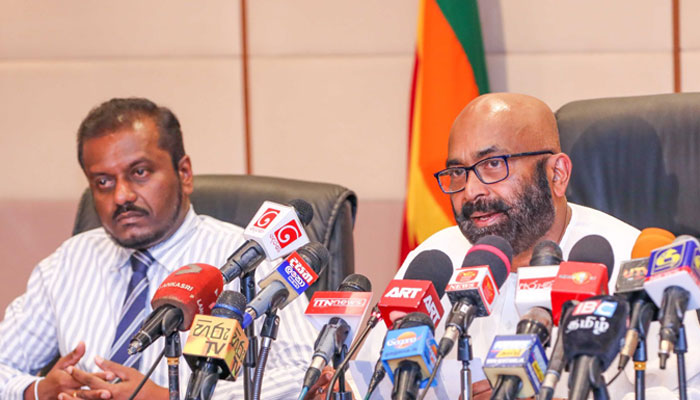Monday Feb 16, 2026
Monday Feb 16, 2026
Thursday, 11 January 2024 01:47 - - {{hitsCtrl.values.hits}}

State Minister of Finance Ranjith Siyambalapitiya yesterday warned that laws will be strictly enforced to eradicate the trade mafia generating profits without proper Value Added Tax (VAT) registration with the Inland Revenue Department (IRD).
He made the observations while participating in a special VAT awareness conference held at the Finance Ministry, organised by Presidential Trade Unions Director General Saman Ratnapriya for the benefit of civil society activists, Government officials, political activists, trade union leaders and journalists.
Siyambalapitiya acknowledged that the challenging times affect everyone, regardless of their economic status, as incomes decrease and expenses rise.
“Increasing State revenue is crucial for economic development. To achieve this, the Government aims to expand the tax base. The direct tax percentage has already increased from 20% to 30%, with plans to further increase it to 40%,” he said, adding that there is potential to reduce indirect taxes in the future.
Finance Ministry Tax Consultant of the Finance Department Tanuja Perera said businesses are required to remit VAT to the IRD monthly, with the amount charged from 1 to 31 January due by 20 February 2024.
She said that failure to do so may result in legal action under the VAT Act by the Finance Ministry.
“Displaying the Inland Revenue Department’s issued license is mandatory for shops eligible to charge VAT. Invoices, following a format set by the IRD Commissioner General, must be issued to consumers after VAT is applied. Strict enforcement is in place against fraudulent businesses collecting money without proper VAT registration, with penalties and collected VAT funds pursued by the Government,” Perera added.
Ratnapriya said the VAT amendment has sparked heated discussions due to numerous misconceptions surrounding with it. “To navigate these complexities, a thorough societal discourse on this VAT amendment is crucial,” he added.
Representing President’s Office Government Revenue Unit K.K.I. Eranda said inefficiencies in VAT collection have now been identified, impacting the potential contribution to the economy.
“Proper VAT collection could add 6% to the gross domestic product (GDP) but currently, only 2% is realised. Three primary areas of tax leakage have been uncovered; businessmen not remitting collected taxes, irregularities by officials, and losses due to tax exemptions. Addressing these leakages is crucial for stabilising the economy,” he added.
At present around 13,000 businesses are VAT-registered, with the Government aiming to increase this number to 50,000 in the future.
